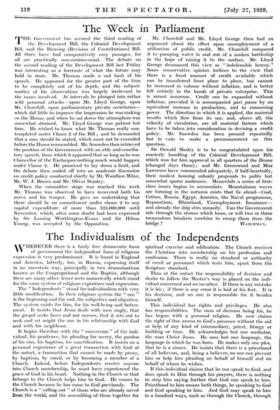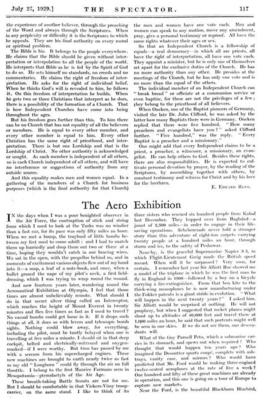The Individualism of the Independents
WHEREVER there is a fairly free democratic form.' of government the independent form of religious expression is very predominant. It is found in England and America, latterly, too, in Russia, expressing itself in no uncertain way, principally in two denominations known as the Congregational and the Baptist, although there arc many other lesser sects numerically which stand for the same system of religious experience and expreSsion.
The " Independents " stand for individualism with very little modification. In their religious system the " one " is the beginning and the end, the subjective and objective. The system exists for him, for his well-being and better- ment. It insists that Jesus deals with men singly, that the gospel seeks faces and not masses, that it sets out to seek and set aright the one in his relationship with God and with his neighbour.
It begins therefore with the " conversion " of the indi- vidual, his penitence, his pleading for mercy, the pardon of his sins, his baptism, his sanctification. It insists on a personal experience of a great transaction with God at the outset, a transaction that cannot be made by proxy, by baptism, by creed, or by becoming a member of a Church. Indeed, before Independents receive anyone into Church membership, he must have experienced the grace of God in his heart. Nothing in the Church or that - belongs to the Church helps him to God. He comes to the Church because he has come to God previously. The Church is a " calling out " of those who are already saved from the world, and the assembling of them together for spiritual exercise and edification. The Church receives the Christian into membership on his profession and confession. There is really no standard or authority of creed or personnel which tests him, apart from the Scripture standard.
Thus at the outset the responsibility of decision and desire to follow the Master's way is placed on the indi- vidual concerned and on no other. If there is any mistake it is his ; if there is any error it is laid at his feet. It is his decision, and no one is responsible for it besides himself.
This individual has rights and privileges. He also has responsibilities. The onus of decision being his, he has begun with a personal religion. He now claims the right of free access to God's presence without the aid or help of any kind of intermediary, priest, liturgy or building or time. He acknowledges but one mediator, the man Christ Jesus. He uses but one language, the language in which he was born. He makes only one plea, that he is a sinner. He insists that there is a priesthood of all believers, and, being a believer, no one can prevent him or help him pleading on behalf of himself and on behalf of whom he wishes.
If this individual claims that he can speak to God, and does speak to Him through his prayers, there is-nothing to stop him saying further that God can speak to him. Priesthood to him means both things, he -speaking to God and God speaking to him. And God may speak to him in a hundred ways, such as through the Church, through the experience of another believer, through the preaching of the Word and always through the Scriptures. When in any perplexity or difficulty it is the Scriptures to which he appeals. They are his final authority on every moral or spiritual problem.
The Bible is his. It belongs to the people everywhere. He claims that the Bible should be given without inter- pretation or interpolation to all the people -of the world. He interprets that Bible as he is led by the Spirit of God to do so. He sets himself no standards, no creeds and no commentaries. He claims the right of freedom of inter- p-refation. He asks for the right of individual belief. When he thinks God's will is revealed to him, he follows it. On this freedom of interpretation he builds. When he gets two or three Christians that interpret as he does, there is a possibility of the formation of a Church. That is how Independent Churches have come into being throughout the ages.
But his freedom goes further than this. To him there can be no Church that has not equality of all the believers or members. He is equal to every other member, and every other member is equal to him. Every other Christian has the same right of priesthood, and inter- pretation. There is but one Lordship and that is the Lordship of Christ. No other authority is acknowledged or sought. As each member is independent of all others, so is each Church independent of all others, and will have no interference or suggestions of authority from any outside source.
And this equality makes men and women equal. In a gathering of the members of a Church for business purposes (which is the final authority for that Church) the men and women have one vote each. Men and women can speak to any motion, move any amendment, pray, give a personal testimony or reproof. All have the same rights whatever their ages or sex.
So that an Independent Church is a fellowship of equals—a real democracy—in which all arc priests, all have the right of interpretation, all have one vote each. They appoint a minister, but he is only one of themselves set apart for the exclusive duties of the Church. He has no more authority than any other. He presides at the meetings of the Church, but he has only one vote and is no more than the equal of the others.
The individual member of an Independent Church can " break bread " or officiate at a communion service or even baptize, for these are not the privileges of a few ; they belong to the priesthood of all believers.
When Oncken, one of the Baptist pioneers of Germany, visited the late Dr. John Clifford, he was asked by the latter how many Baptists there were in Germany. Oncken replied that there were five hundred. " How many preachers and evangelists have you ? " asked Clifford further. :" Five hundred," was the reply. " Every Baptist is a preacher and a missionary."
One might add that every Independent claims to be a priest, a preacher, a witnesser, a missionary, an evan- gelist. He can help others to God. Besides these rights, there are also responsibilities. He is expected to cul- tivate personal devotion by prayer, by the reading of the Scriptures, by assembling together with others, by constant testimony and witness for Christ and by his love for the brethren.
E. EBRARD BEES.



































 Previous page
Previous page